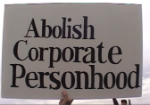John Friedman, CSR-P, in his Sustainable Life Media blog post asks the question, Is the Occupy Movement a Call for Sustainability? His response is well thought out and makes for excellent reading. The article spurred me on to express my thoughts on Why the Occupy Movement is a Call for Sustainability. This is a perspective gleaned from having reviewed hundreds of videos based on a Web-wide query for sustainability voices; being at the Occupy Portland event as a video documentarian, and writing several blog posts.
As John points out “The initial media stories were somewhat dismissive; focusing on the lack of clarity and focus as the movement grew, perhaps forgetting that democracy is inherently a messy process…” reinforcing my belief that mainstream media folks are suffering from what activist Julia Butterly Hill calls “disconnected consciousness.”
From my perspective, the occupy movement reflects connection and consciousness, especially around issues, programs and actions that may be legal, but are immoral as well as those that are illegal and immoral. It should come as no surprise that those in  seats of power and leadership who have chosen to see and profit from the world only through the green lens of consumerism (and also suffering form disconnected consciousness) are shaking their heads, mystified over what exactly it is that these folks are doing out there and where, for heavens sake, is the deal, the offer, the ROI, the plan for fixing every little thing.
seats of power and leadership who have chosen to see and profit from the world only through the green lens of consumerism (and also suffering form disconnected consciousness) are shaking their heads, mystified over what exactly it is that these folks are doing out there and where, for heavens sake, is the deal, the offer, the ROI, the plan for fixing every little thing.
It has taken sometime for our citizens to wrap their heads around the concepts that corporations are individuals, big money is to be made from caring for the sick and the dying, and mothers and children who are poor are the scammers out there we need to be protected from, especially if they come from Mexico to work in our fields and contribute to food production. I hear the voices of sustainability in the signs and speeches at Occupy events and who now join hundreds of others in the sustainability movement such as Julia Butterfly Hill or Raj Patel who advises us generosity is the
antidote to greed or author Sharif Abdullah who explains economics in terms of criminality and morality or economist John Perkins who rightly points out we – producers and consumers – have “looked the other way” to social and economic costs in order to maximize profits and buy more and more cheap stuff or or any of the thousands of voices of sustainability out there who if they not on the street (yet) are at least online and in our libraries, accessible to all.


